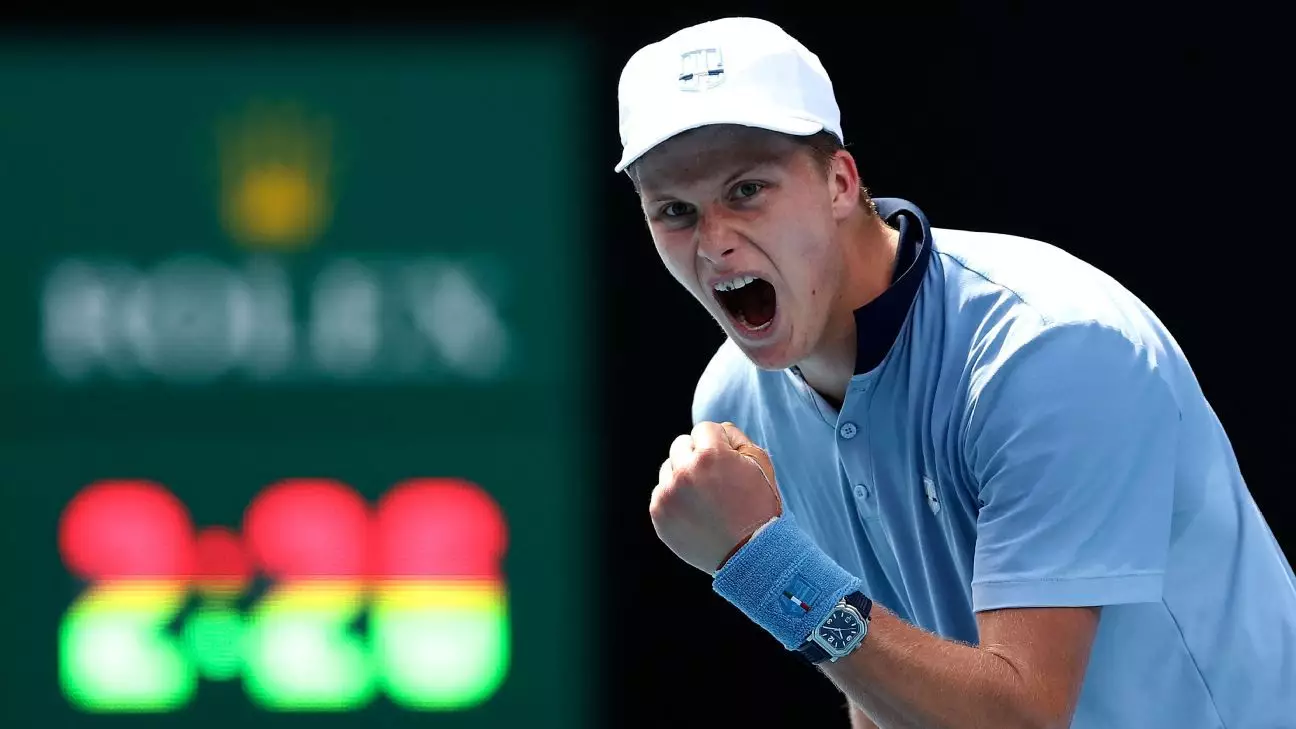Jenson Brooksby’s journey in professional tennis has been anything but straightforward. Once a promising player ranked No. 33 at the young age of 21, he faced setbacks that would challenge not just his career but also his mental resilience. After nearly two years away from competitive tennis, Brooksby is preparing for a return that will test his physical preparations and emotional fortitude as well. The combination of injuries, surgeries, and the fallout from a suspension related to missed drug tests left Brooksby unranked and yearning to reclaim his place in the sport he loves. His story serves as a reminder of how personal challenges can affect an athlete’s performance and mental health.
Brooksby’s absence from the tour was filled with frustration and disappointment. His experience is not unique in the world of sports; many athletes face similar struggles, but what sets Brooksby apart is his openness about his battles both on and off the court. As he readies himself for the upcoming Australian Open, he has taken the opportunity to address his experiences with autism spectrum disorder. In doing so, he publicizes not only his achievements but also his vulnerabilities, something that can resonate deeply with fans and aspiring athletes alike.
For Brooksby, autism has been both a challenge and a strength in his tennis career. Diagnosed at a young age, he spent significant time in therapy to develop communication skills that many take for granted. Speaking candidly about his past, Brooksby mentioned how he was nonverbal until the age of four and the extensive time he dedicated to overcoming barriers in social interactions. This background helps to paint a picture of the determination and work ethic that has propelled him on his path.
Interestingly, Brooksby attributes aspects of his autism as advantageous during competitions. He highlighted the ability to concentrate on specific details while under pressure, which can be pivotal in a high-stakes environment such as a Grand Slam match. However, he also recognizes the flip side to this capability; moments of frustration can lead to emotional outbursts, a fact that has required ongoing awareness and management from both Brooksby and his support team. The balance between leveraging personal strengths while managing emotions presents an ongoing challenge that athletes, especially those with similar conditions, might face.
Over the past two years, Brooksby has navigated a complex landscape of physical setbacks and scrutinized circumstances surrounding his ban from tennis. Initially suspended for failing to attend drug tests, he later appealed the decision and was able to work with the International Tennis Integrity Agency to reduce his suspension. This ordeal has highlighted the importance of understanding how personal conditions, such as autism, can influence decision-making and executive functioning. His rehabilitation process suggests a collaborative effort to ensure Brooksby can transition back into competitive play with renewed vigor and enhanced awareness of his unique needs.
The path to recovery for Brooksby has not merely been physical; it has also involved assembling a team of coaches and support staff who can assist him in honing his skills and improving his mental game. The synergy between his trainers and his awareness of his condition has become essential as he reconstructs his approach to training and competition. Such a multifaceted strategy not only prepares him for the rigors of professional tennis but also showcases a commitment to understanding oneself holistically.
As Brooksby approaches a new chapter in his career, he emphasizes the importance of authenticity and self-acceptance. The decision to speak more openly about his autism is a significant step not only for him but for many others who may feel the pressure to conform to societal norms. By sharing his narrative, Brooksby provides a platform for greater awareness of autism in sports, illustrating that personal struggles can coexist with professional aspirations.
His hope that others understand him as a complete person, beyond just an athlete, reflects a broader desire for inclusivity and understanding in the world of sports. As Brooksby gears up for competition, he not only aims to reclaim his spot in the rankings but also aspires to empower others who might face similar battles, encouraging them to be open about their experiences.
Jenson Brooksby’s story is not just one of tennis; it is a testament to resilience, courage, and the power of embracing one’s identity. As he prepares to step back onto the court, Brooksby represents a new generation of athletes who are both competitive and vulnerable, ready to inspire while pursuing their dreams.


Leave a Reply